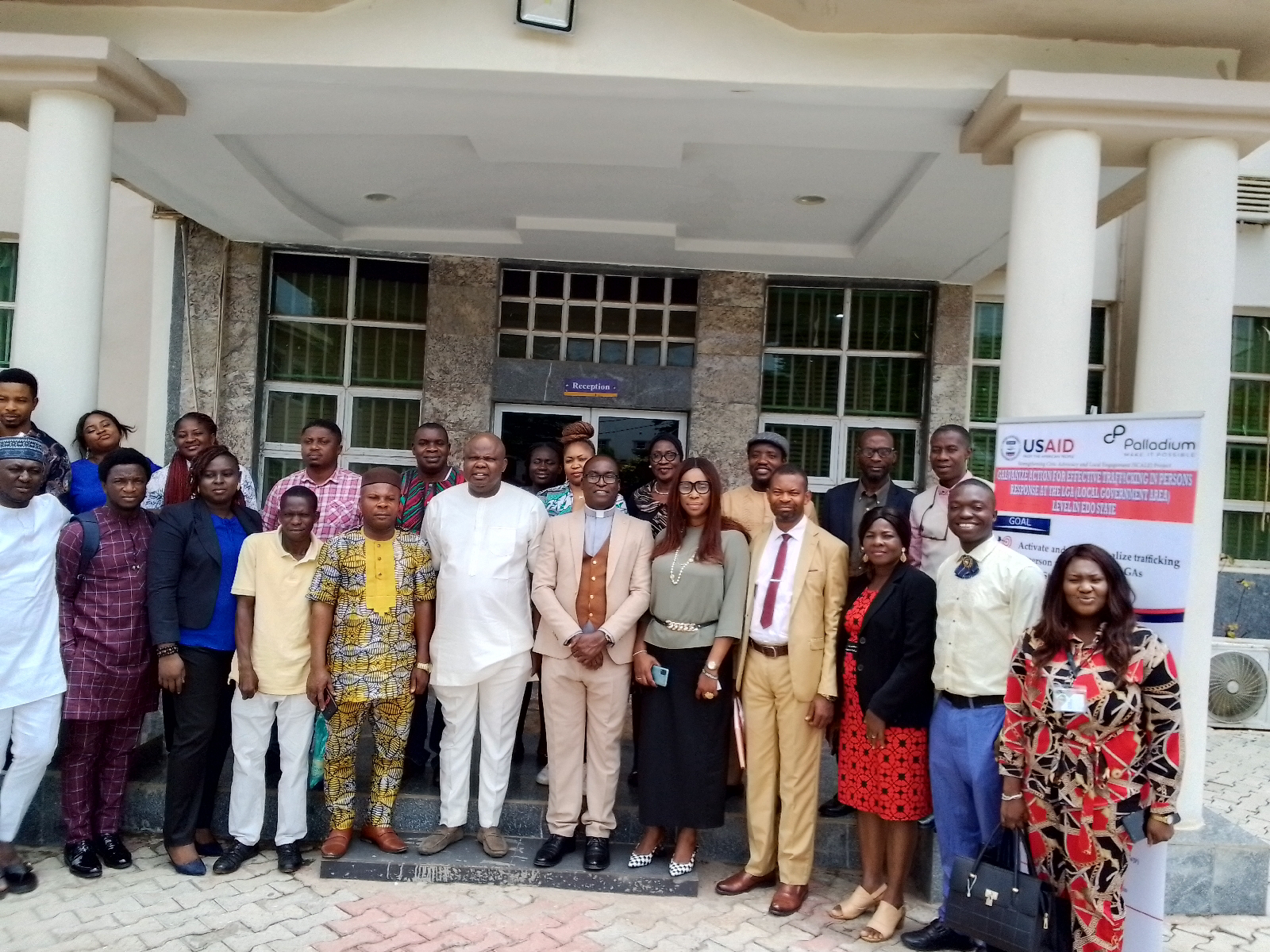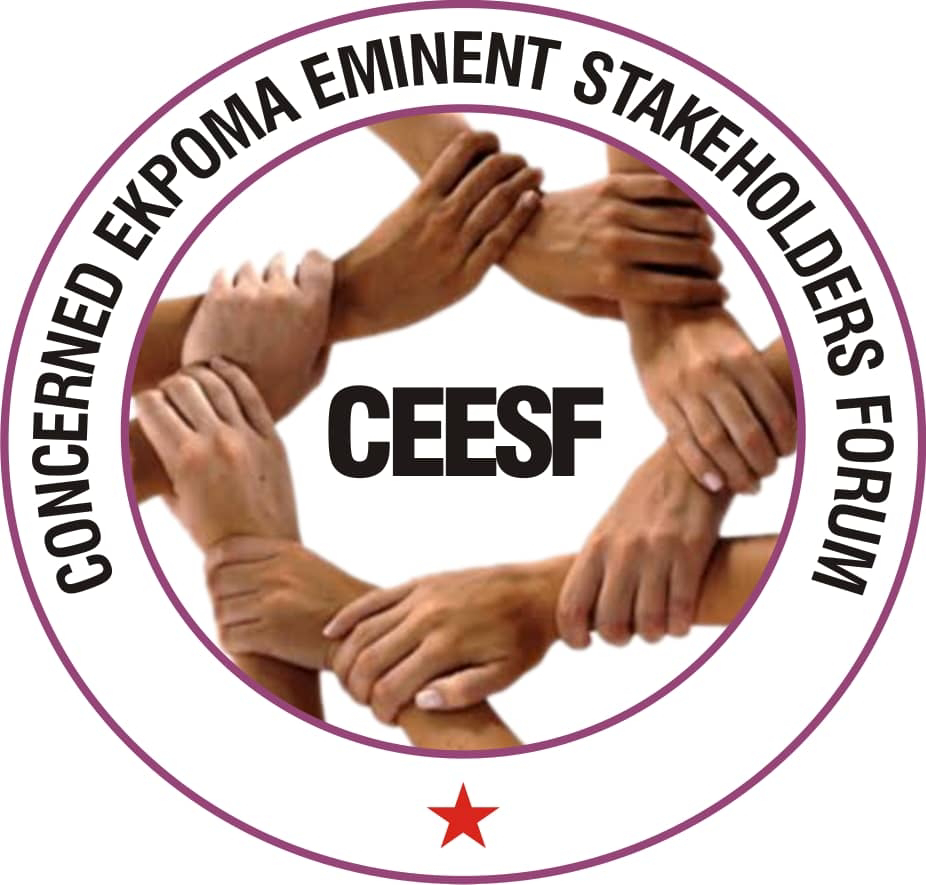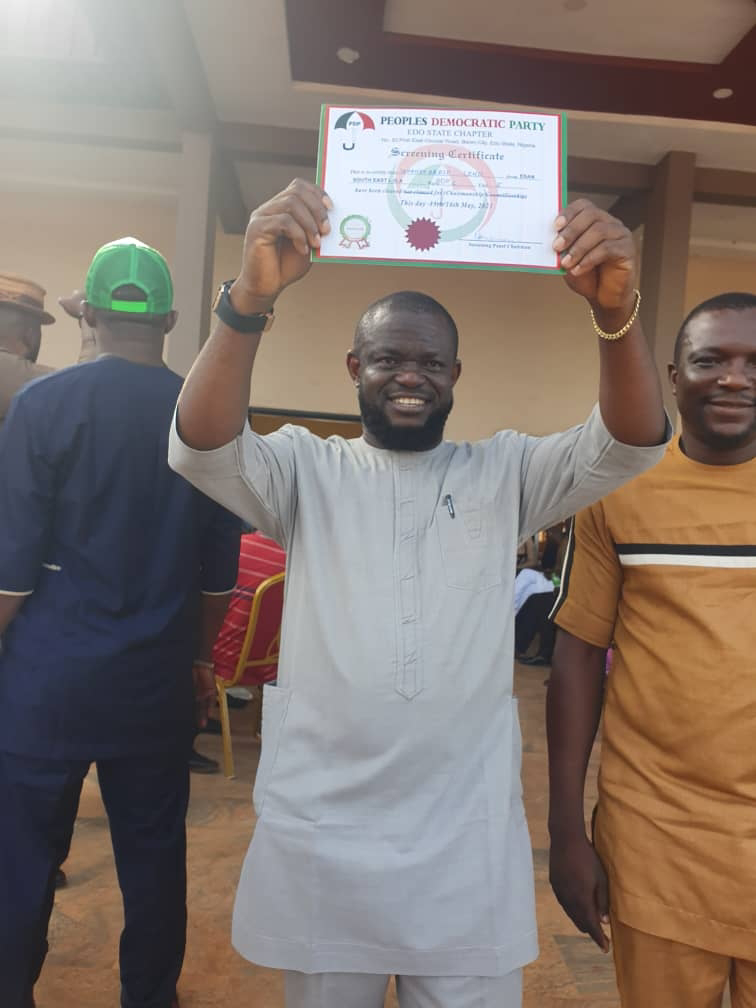JDPCI Engages Private Sector on Rehabilitation of Trafficking Victims
By Lucky Isibor
In its efforts to assist victims of human trafficking to be reintegrated into the society and empower them to avoid being retrafficked or venture into other crimes, the Justice Development and Peace Caritas Initiative of Uromi Catholic Diocese (Uromi JDPCI), last Thursday, 20 April had an interactive session with members of the organised private sector in Edo State with a view to keying into the operations of the Victims of Trafficking Trust Fund (VTTF) as contained in the Edo State Trafficking in Persons Law 2018.
The consultative forum was put together by Uromi JDPCI under the auspices of the Localizing Trafficking in Persons Response (LOTIP-R) Cluster under the Strengthening Civic Advocacy and Local Engagement (SCALE) project sponsored by the United States Agency for International Development (USAID) and implemented by Palladium. Anchored by Uromi JDPCI, the cluster is drawn from civil society organisations and a government agency, including Josemaria Escriva Foundation (JOSEF), Girls Power Initiative (GPI), Ideal Development and Resource Centre (IDRC), Willi Johnson Foundation (WJF), Justice Development and Peace Commission (JDPC) Auchi and Edo State Taskforce Against Human Trafficking (ETAHT).
Briefing members of the private sector on the essence of the interactive session before breaking into a panel of discussion, the Executive Director of Uromi JDPCI, Rev Fr (Dr.) Fidelis Arhedo said the cluster is advocating for the activation of the Victims of Human Trafficking Trust Fund, establishment of the Committee on Victims of Human Trafficking Trust Fund as contained in the Edo State Trafficking in Persons Law 2018 and the establishment of the Edo State Taskforce Against Human Trafficking (ETAHT) in all the Local Government Areas of the state.
Dr. Arhedo explained that the victim support fund is solely meant for the empowerment of victims and survivors of human trafficking and appealed to members of the private sector to contribute to the fund assuring that some of their members will be included in the committee when it's constitution is activated to ensure judicious utilisation of the fund.
"The aim of this meeting is to bring together members of the private sector to engage them to look at, as they discharge their Corporate Social Responsibility (CSR), to note that there is the need to support victims of human trafficking. This will enable them to contribute to the trust fund. And in case they want to talk to government in terms of tax rebate if they contribute to this trust fund, they should also discuss and acquaint them with modalities for the operationalisation of this trust fund so that the money paid into this trust fund will not be misused or embezzled. It is also to know if they have any objection to raise or modalities for this operation, they should also say it. To let them know we need their support to contribute to this trust fund.
"The trust fund is meant for the victims and survivors of human trafficking, to empower them, to reintegrate them into the society. The committee should be set up and they can be part of the committee to see how the fund is utilised and monitor it. We need them to be part of it to support the trust fund"
In his remarks, the Social Protection Advisor of the USAID-Palladium Project, Mr. Eric Umoru who represented the USAID-Palladium Project, commended Edo State government for the steps it has taken thus far to check human trafficking, but noted that there are still gaps in the implementation of the law hence Uromi JDPCI is pushing for the full implementation of the provisions of the law.
While soliciting the support of the organised private sector, Umoru said: "The government have come up with a law in 2018, they set up a Taskforce, so there've been a lot of progress. But the gap is in the implementation of the law, that's where there's been shortfall from the government. What we are now doing strategically with the help of JDPCI is to push government to demand for some kind of accountability, to say you passed this law in 2018, part of this law is to establish victims of trafficking trust fund and uptill today it has not been established .
"They're trying to bridge that gap so that what is supposed to be done by the government is done.
Now they're calling on the private sector, on your own terms, based on how it is convenient for you. I know most businesses have CSR depending on your scale and annual turnover, but no matter how little it is.
"The law says this fund is open. When they take human trafficking cases to court and there is conviction, they make an order of forfeiture. If the trafficker built houses and they can trace those houses, they'll confiscate those assets, they'll sell it, if this trust fund is available the money realised from the sales will go there. But they are also calling on individuals and corporate bodies to donate to the fund. The fund is meant for the victims, it's not meant to run government establishment, it is not to buy diesel. It is for victims, actual victims, people who have suffered exploitation in human trafficking", Umoru assured.
In their separate submissions, the panellists comprising the Executive Director of Lift Above Poverty Organisation (LAPO), Dr.Abayomi Obadiora, the Executive Secretary of the Edo/Delta State of the Manufacturers Association of Nigeria (MAN), Lucky Amachree, the Managing Director of Vichi Gates Hotel, Mr. Victor Idusogie and Josephine Erazua of the United Bank for Africa (UBA), noted that human trafficking is being promoted by the erosion of family and societal values, the get rich quick syndrome, some youths who are not even willing to work among others.
In his contribution, a medical practitioner and human rights activist, Dr. Bright Onivikukor also identified low wages paid by some employees as making some people vulnerable to trafficking and called for the close monitoring of some overseas university admission agencies noting that there are reports that people are being trafficked through that.
While making commitment towards empowering the victims and survivors, the Executive Director of LAPO, Dr. Abayomi Obadiora called for collaboration with Uromi JDPCI for the training of the victims and survivors on how to manage their business.
"At LAPO, we don't give out grant, we give out loan because some people don't know how to use grants. We attach some level of responsibility to the loans.
Any organisation, Community Based Organisations (CBOs), Faith Based Organisations (FBOs) that are into empowerment can benefit from LAPO existing structure. We have LAPO institute where we train people on how to provide empowerment services and I know that we have mentored some CBOs on that.
"For us to be able to be part of the initiative, we need to look at some of our programmes like our micro credit services. We can look at some viable economic activities the victims can involve in. Every programme that we are going to do will have to comply with our procedures but we don't support start ups, for that person to benefit from LAPO services, the person must have been active, no matter how small the business is, we must be able to see something that this person is already involved in this business; whether is a victim or is vulnerable, they can always benefit".
Also making commitment, the Managing Director of Vichi Gates Hotel, Mr. Victor Idusogie promised to include Uromi JDPCI among beneficiaries of its CSR and assist in talking to some politicians and state actors on the need to activate the victims of human trafficking trust fund.
The Executive Secretary of MAN for Edo/Delta States, Mr. Lucky Amachree promised to table the issue before the board of the association adding, "Beside that, We have a platform, we have companies where employment can be generated. If these victims are back and those that can be integrated into the society, we can ensure that they have something to do with their hand if they are willing to do that".




Comments
Post a Comment